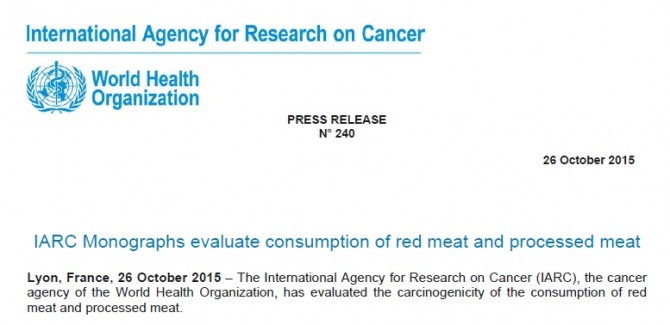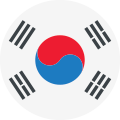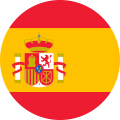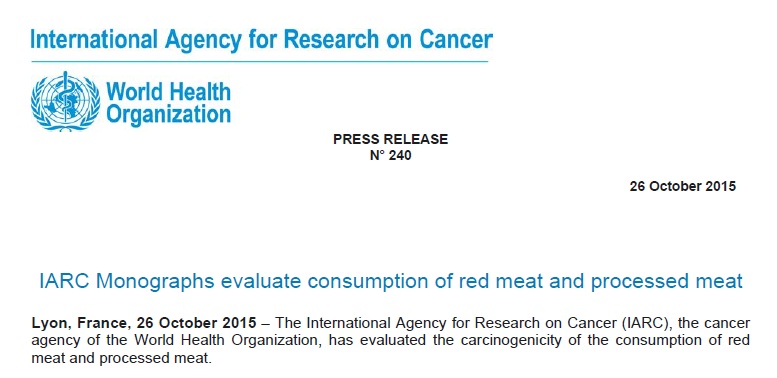 이미지 확대보기
이미지 확대보기유엔 세계보건기구(WHO) 산하의 국제암연구소(IARC)는 지난 27일 소시지와 햄 등 가공육과 붉은 고기 등의 섭취가 암을 유발할 가능성이 있다는 평가를 내렸다.
국제암연구소(IARC)는 이날 전세계 10개국 22명의 전문가가 참가한 가운데 육류 섭취와 암의 상관 관계에 대한 800여 건의 연구 조사를 공개했다.
이 보고서에서 국제 암 연구소는 소시지나 햄 등 일정한 공정을 거친 육류나 붉은 고기를 섭취하는 것이 직장암이나 대장암을 유발할 가능성이 있다고 밝혔다.
1군 발암물질로는 담배와 석면등이 지정되어 있다.
유엔 세계보건기구(WHO) 산하의 국제암연구소(IARC)는 프랑스 리옹에 본부를 두고 있다.
가공육이 발암물질이라는 발암물질이라는 보고서 발표 이후 가공육 소비가 줄어드는 등 큰 소동을 빚고 있다.
과연 진상이 무엇인지
국제암연구소(IARC)가 밝힌 보고서 원문을 읽어 볼 필요가 있을 것 같다.
다음은 국제 암연구소의 보도자료 전문.
PRESS RELEASE
IARC Monographs evaluate consumption of red meat and processed meat Lyon, France, 26 October 2015 – The International Agency for Research on Cancer (IARC), the cancer agency of the World Health Organization, has evaluated the carcinogenicity of the consumption of red meat and processed meat.
After thoroughly reviewing the accumulated scientific literature, a Working Group of 22 experts from 10 countries convened by the IARC Monographs Programme classified the consumption of red meat as probably carcinogenic to humans (Group 2A), based on limited evidence that the consumption of red meat causes cancer in humans and strong mechanistic evidence supporting a carcinogenic effect.
This association was observed mainly for colorectal cancer, but associations were also seen for pancreatic cancer and prostate cancer.
Processed meat was classified as carcinogenic to humans (Group 1), based on sufficient evidence in humans that the consumption of processed meat causes colorectal cancer.
The consumption of meat varies greatly between countries, with from a few percent up to 100% of people eating red meat, depending on the country, and somewhat lower proportions eating processed meat.
The experts concluded that each 50 gram portion of processed meat eaten daily increases the risk of colorectal cancer by 18%.
“For an individual, the risk of developing colorectal cancer because of their consumption of processed meat remains small, but this risk increases with the amount of meat consumed,” says Dr Kurt Straif, Head of the IARC Monographs Programme.
“In view of the large number of people who consume processed meat, the global impact on cancer incidence is of public health importance.”
The IARC Working Group considered more than 800 studies that investigated associations of more than a dozen types of cancer with the consumption of red meat or processed meat in many countries and populations with diverse diets.
The most influential evidence came from large prospective cohort studies conducted over the past 20 years.
”These findings further support current public health recommendations to limit intake of meat,” says Dr Christopher Wild, Director of IARC.
“At the same time, red meat has nutritional value. Therefore, these results are important in enabling governments and international regulatory agencies to conduct risk assessments, in order to balance the risks and benefits of eating red meat and processed meat and to provide the best possible dietary recommendations.”
Red meat refers to all types of mammalian muscle meat, such as beef, veal, pork, lamb, mutton, horse, and goat.
Processed meat refers to meat that has been transformed through salting, curing, fermentation, smoking, or other processes to enhance flavour or improve preservation. Most processed meats contain pork or beef, but processed meats may also contain other red meats, poultry, offal, or meat by-products such as blood.
Examples of processed meat include hot dogs (frankfurters), ham, sausages, corned beef, and biltong or beef jerky as well as canned meat and meat-based preparations and sauces.
A summary of the final evaluations is available online in The Lancet Oncology, and the detailed assessments will be published as Volume 114 of the IARC Monographs.
The International Agency for Research on Cancer (IARC) is part of the World Health Organization. Its mission is to coordinate and conduct research on the causes of human cancer, the mechanisms of
carcinogenesis, and to develop scientific strategies for cancer control. The Agency is involved in both epidemiological and laboratory research and disseminates scientific information through publications, meetings, courses, and fellowships.
김윤식 기자 tiger8280@




















![[뉴욕증시] 美·EU 무역협상 난항에 혼조세](https://nimage.g-enews.com/phpwas/restmb_setimgmake.php?w=270&h=173&m=1&simg=2025071905245702748be84d87674118221120199.jpg)





















